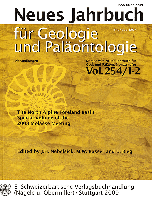
NEUES JAHRBUCH FUR GEOLOGIE UND PALAONTOLOGIE-ABHANDLUNGEN
Scope & Guideline
Advancing Knowledge in Geology and Paleontology
Introduction
Aims and Scopes
- Paleontological Research:
The journal emphasizes the discovery and analysis of fossilized remains, contributing to the understanding of extinct species and their evolutionary relationships. - Geological Studies:
It covers a wide range of geological topics, including sedimentology, stratigraphy, and biostratigraphy, aiming to reconstruct past environments and geological events. - Ichnology and Taphonomy:
Research on trace fossils and the processes of fossilization is a key area, providing insights into ancient ecosystems and biological interactions. - Systematics and Taxonomy:
The journal includes studies that refine classification systems for various taxa, including invertebrates, vertebrates, and plants, contributing to the broader understanding of biodiversity through time. - Paleoecology and Paleobiogeography:
Research that explores the interactions between ancient organisms and their environments, as well as their geographical distribution, is a significant focus. - Evolutionary Biology:
The journal publishes findings related to the evolutionary history of life, including morphological and phylogenetic studies that shed light on the development of various groups.
Trending and Emerging
- Innovative Fossil Discoveries:
Recent publications highlight a surge in the description of new fossil species and genera, particularly from underexplored regions, indicating a growing interest in biodiversity and paleobiogeography. - Paleoenvironmental Reconstructions:
An increasing number of studies are dedicated to reconstructing ancient environments using integrated approaches that combine sedimentological, paleontological, and geochemical data. - Technological Advances in Paleontology:
Emerging methodologies, such as high-resolution imaging and molecular techniques, are being applied to fossil studies, enhancing the understanding of ancient life forms and their relationships. - Interdisciplinary Approaches:
There is a rising trend towards interdisciplinary research that combines paleontology with fields such as ecology, geology, and climate science, reflecting a holistic approach to understanding Earth's history. - Impact of Climate Change on Fossil Records:
Recent themes emphasize the implications of climate change on fossil assemblages, with studies exploring how past climatic events have influenced biodiversity and extinction patterns.
Declining or Waning
- Recent Extinction Events:
There has been a noticeable decline in studies specifically focusing on recent extinction events compared to earlier years, likely due to a shift towards exploring deeper historical contexts. - Cultural and Anthropological Paleontology:
Research linking paleontological findings with cultural or anthropological perspectives appears to have waned, as the journal increasingly prioritizes strictly scientific investigations. - Microfossil Studies:
Although still relevant, the frequency of papers dedicated to microfossils has decreased, possibly due to a broader focus on macrofossil discoveries and their implications. - Historical Geology:
The emphasis on historical geological narratives and local geological histories has diminished, with a stronger focus now on global geological processes and patterns. - Paleoclimatology:
Research specifically aimed at reconstructing ancient climates has become less frequent, possibly overshadowed by more comprehensive studies that integrate climate data with broader geological findings.
Similar Journals

PALAEONTOLOGIA ELECTRONICA
Championing Open Science in Paleontology and BeyondPALAEONTOLOGIA ELECTRONICA is a distinguished open-access journal published by COQUINA PRESS, offering a vital platform for the dissemination of cutting-edge research in the fields of Paleontology and Oceanography. Launched in 1998, this journal has continuously fostered scholarly communication, allowing unrestricted access to scientific findings and contributing significantly to the advancement of the field. With an impressive track record since its inception, PALAEONTOLOGIA ELECTRONICA holds a 2023 Scopus ranking of #39 out of 113 in the Paleontology category, demonstrating its value among academic resources as evidenced by its Q2 quartile ranking. The journal is based in the United States, and it encourages submissions that span a diverse range of topics, from fossil analysis to evolutionary biology. As a prominent resource for researchers, educators, and students alike, it plays a crucial role in shaping the future of paleontological study.

JOURNAL OF THE PALAEONTOLOGICAL SOCIETY OF INDIA
Championing High-Quality Research in Paleontological SciencesThe JOURNAL OF THE PALAEONTOLOGICAL SOCIETY OF INDIA, published by SAGE PUBLICATIONS INDIA PVT LTD, stands as a significant resource in the field of paleontology, dedicated to disseminating high-quality research and findings from the Indian subcontinent and globally. With an ISSN of 0552-9360, this journal has established itself within the academic community, particularly as it converges its publication years from 2011 to 2024. Ranking in the Q4 category of paleontology as of 2023, it serves an essential niche for researchers and students interested in the historical biological records and evolutionary processes. Despite its current Scopus ranking of #88 out of 113 in the Earth and Planetary Sciences category, the journal plays a pivotal role in fostering scholarly dialogue and advancing the understanding of paleontological sciences in India and beyond. Researchers are encouraged to contribute to this evolving field and share their findings, solidifying the journal's commitment to highlighting significant paleontological research contributions.

PALEONTOLOGICAL JOURNAL
Unlocking the Mysteries of Our Planet’s History.The PALEONTOLOGICAL JOURNAL, published by PLEIADES PUBLISHING INC, is a premier platform for the dissemination of research in the field of paleontology. With an ISSN of 0031-0301 and E-ISSN 1555-6174, this journal serves the academic community by providing insights into fossil studies, evolutionary biology, and the historical narrative of life on Earth. Despite being categorized in the Q3 quartile for 2023 and currently holding a Scopus rank of #84 out of 113 in the Earth and Planetary Sciences- Paleontology category, it remains a valuable resource for researchers and practitioners. The journal's coverage spans from 1990 to 2024, offering a comprehensive historical perspective while also addressing contemporary issues in paleological research. Scholars and students alike benefit from its rigorous peer-reviewed articles and the opportunity to access vital knowledge in the ever-evolving field of paleontology.

JOURNAL OF IBERIAN GEOLOGY
Fostering innovation in stratigraphy and geological studies.JOURNAL OF IBERIAN GEOLOGY, published by Springer International Publishing AG, is a pivotal platform dedicated to advancing the field of geology and stratigraphy. With an ISSN of 1698-6180 and E-ISSN of 1886-7995, this journal has earned its reputation in the academic community, holding a commendable Q2 ranking in both Geology and Stratigraphy for 2023, reflecting its contributions to contemporary geological research. Spanning from 2007 to 2024, it provides a comprehensive forum for scholars and practitioners from around the globe to disseminate their findings pertaining to the Iberian Peninsula, enhancing the understanding of regional geological phenomena. The journal has carved out a significant niche within the Earth and Planetary Sciences, ranking #137 out of 321 in Geology and #24 out of 55 in Stratigraphy, indicating its wide-reaching impact and scholarly engagement. The Journal of Iberian Geology serves as an indispensable resource for those interested in the complexities of geological structures, stratigraphic sequences, and the broader implications of geological research, making it a vital reference for researchers, professionals, and students alike.
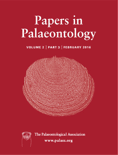
Papers in Palaeontology
Advancing Knowledge in Evolutionary HistoryPapers in Palaeontology, published by WILEY, is a premier academic journal dedicated to advancing the field of paleontology. With an admirable impact factor and positioned within the Q1 category in Paleontology for 2023, this journal has established itself as a leading platform for innovative research and discussion, ranking 17th out of 113 in Scopus’s Earth and Planetary Sciences category. Since its inception in 2015, Papers in Palaeontology has aimed to publish high-quality, peer-reviewed articles that explore the diversity of ancient life forms and their evolutionary history. Researchers, professionals, and students alike will find valuable insights and rigorous analyses that contribute to the understanding of our planet’s past. Although Open Access options are not available, the journal provides a wealth of knowledge essential for anyone engaged in the study or practice of paleontology, solidifying its importance in shaping future academic discourse.

CARNETS DE GEOLOGIE
Connecting Researchers to the Heart of Earth SciencesCarnets de Geologie is a prominent open-access journal dedicated to the dynamic fields of geology, paleontology, and stratigraphy. Published by Carnets Geologie and based in France, the journal has been a platform for scholarly communication since 2002, facilitating unrestricted access to high-quality research. With a robust impact reflected in its 2023 quartile rankings—Q2 in Geology, Paleontology, and Stratigraphy—Carnets de Geologie ranks favorably within Scopus, positioning itself at the 60th percentile for Earth and Planetary Sciences. The journal aims to disseminate innovative research findings and foster academic discourse among researchers, professionals, and students interested in the intricate aspects of Earth's history and processes. Encompassing a broad scope that reflects continuous developments in the geological sciences, Carnets de Geologie is dedicated to advancing knowledge and understanding within its community.
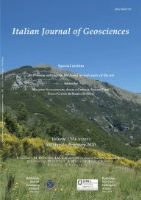
Italian Journal of Geosciences
Transforming Knowledge: Open Access to Earth Science BreakthroughsItalian Journal of Geosciences, published by the Società Geologica Italiana, is a distinguished platform for the dissemination of research in the fields of Earth and Planetary Sciences and Geology. With an impressive impact factor reflected in its 2023 rankings, where it placed in the Q3 category across its related fields, this journal serves as a vital resource for academics, practitioners, and students. Established in 2010 and poised to continue until 2024, the journal showcases critical advancements and interdisciplinary studies that deepen our understanding of geological processes and Earth systems. Operating under open access options, it offers robust accessibility to a broad audience, facilitating wider dissemination of knowledge. The journal's affiliation with Università degli Studi La Sapienza in Rome, Italy, further underscores its commitment to academic excellence and innovation in geosciences.

BULLETIN OF GEOSCIENCES
Pioneering Insights in Earth and Planetary SciencesBULLETIN OF GEOSCIENCES, published by the prestigious Czech Geological Survey, stands as a pivotal resource in the fields of Earth and Planetary Sciences and Environmental Science. Since its inception in 2003, the journal has been committed to advancing knowledge through high-quality research, currently holding a commendable Q2 ranking in both disciplines. With its focus on diverse and innovative topics, BULLETIN OF GEOSCIENCES provides an essential platform for researchers, professionals, and students aiming to disseminate and access impactful studies. The journal is indexed in Scopus, ranking #78/195 in General Earth and Planetary Sciences and #110/233 in General Environmental Science, reflecting its significant contribution to academia. Publishing from Prague, Czech Republic, this journal invites contributions that illuminate the interactions between geological processes and environmental phenomena, ensuring an inclusive and accessible approach to crucial global issues.
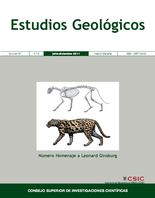
ESTUDIOS GEOLOGICOS-MADRID
Connecting Researchers with Earth’s Secrets Since 1976.ESTUDIOS GEOLOGICOS-MADRID is a prominent journal in the field of geology, published by the esteemed Consejo Superior de Investigaciones Científicas (CSIC) in Spain. Established in 1976, this Open Access journal has been a vital resource for researchers and professionals since its inception. With an impact factor reflecting its contribution to the Earth and Planetary Sciences community, ESTUDIOS GEOLOGICOS-MADRID currently holds a Q3 category ranking in Geology as of 2023, showcasing its relevance and quality within the discipline. The journal publishes a diverse array of geological studies, ensuring wide-reaching access to significant research findings, thereby promoting collaboration and knowledge sharing. Established as a platform for both foundational research and applied geology, this journal fosters academic growth and contributes to understanding the Earth’s processes. Researchers, professionals, and students are encouraged to explore its extensive archive, which includes publications from 1976 to the present. For more information, visit the journal's editorial office at Editorial CSIC, C/VITRUVIO 8, 28006 MADRID, SPAIN.
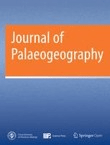
Journal of Palaeogeography-English
Bridging the Past and Present of Our PlanetThe Journal of Palaeogeography-English, published by Elsevier Science Inc, is a leading peer-reviewed open access journal that has been an essential resource for researchers since its establishment in 2012. With its focus on Earth-Surface Processes, Geography, Planning, Development, and Paleontology, the journal has secured a premier position in the academic community, recently achieving Q1 category rankings in multiple fields. The journal's current impact is reflected in its Scopus rankings, placing it in the top percentile of its categories, such as rank #12 in Paleontology and #39 in Earth-Surface Processes. With open access options, it facilitates wide dissemination and engagement with high-quality research, making significant contributions to our understanding of geographical and paleontological phenomena. As the journal converges towards 2024, it aims to continue fostering innovative research and interdisciplinary dialogue that will stimulate advancements in our knowledge of Earth’s past and present environments, appealing to a diverse audience of researchers, professionals, and students alike.